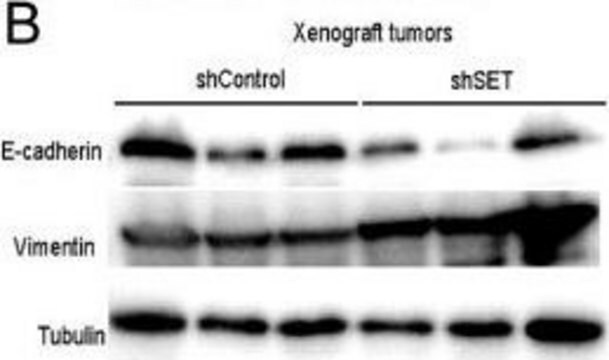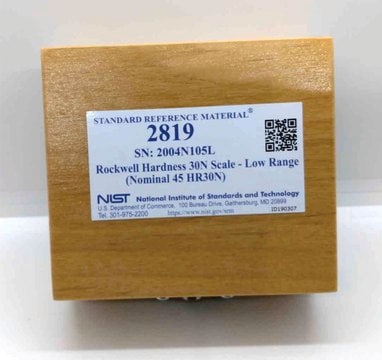GW22597F
Anti-S100A6 antibody produced in chicken
affinity isolated antibody, buffered aqueous solution
Sign Into View Organizational & Contract Pricing
All Photos(1)
About This Item
Recommended Products
biological source
chicken
Quality Level
conjugate
unconjugated
antibody form
affinity isolated antibody
antibody product type
primary antibodies
clone
polyclonal
form
buffered aqueous solution
species reactivity
mouse, rat, human
technique(s)
western blot: suitable
NCBI accession no.
UniProt accession no.
shipped in
wet ice
storage temp.
−20°C
Gene Information
human ... S100A6(6277)
General description
Protein S100-A6 is a homodimeric protein encoded by the S100A6 gene in humans. It is a member of S100 protein family. It is involved in several biological functions such as cell proliferation, differentiation, morphology, cytoskeletal organization and apoptosis.
Application
Anti-S100A6 antibody produced in chicken is suitable for western blotting analysis at a dilution of 1:500, for tissue or cell staining at a dilution of 1:200.
Biochem/physiol Actions
Protein S100-A6 is a homodimeric protein encoded by the S100A6 gene in humans and is a member of S100 protein family. It has biological functions in cell proliferation, differentiation, morphology, cytoskeletal organization and apoptosis. S100A6 plays an important role in regulating endothelial commitment to, and progression through, the cell cycle. It is involved in several vital biological functions, such as calcium sensing and cell proliferation. S100A6 helps in promoting proliferation and migration of human hepatoma cells. Overexpression results in alteration of E-cadherin and β-catenin and is over expressed in human hepatocellular carcinoma.
Physical form
Solution in phosphate buffered saline containing 0.02% sodium azide.
Disclaimer
Unless otherwise stated in our catalog or other company documentation accompanying the product(s), our products are intended for research use only and are not to be used for any other purpose, which includes but is not limited to, unauthorized commercial uses, in vitro diagnostic uses, ex vivo or in vivo therapeutic uses or any type of consumption or application to humans or animals.
Not finding the right product?
Try our Product Selector Tool.
Storage Class Code
10 - Combustible liquids
WGK
WGK 1
Flash Point(F)
Not applicable
Flash Point(C)
Not applicable
Personal Protective Equipment
dust mask type N95 (US), Eyeshields, Gloves
Certificates of Analysis (COA)
Search for Certificates of Analysis (COA) by entering the products Lot/Batch Number. Lot and Batch Numbers can be found on a product’s label following the words ‘Lot’ or ‘Batch’.
Already Own This Product?
Find documentation for the products that you have recently purchased in the Document Library.
Ziqiang Li et al.
Journal of molecular medicine (Berlin, Germany), 92(3), 291-303 (2013-11-28)
High levels of S100A6 have been associated with poor outcome in some types of human cancers, but the role of S100A6 in the molecular pathogenesis of these cancers is largely unknown. This study was performed to explore the expression and
Honglin He et al.
Protein expression and purification, 83(1), 98-103 (2012-03-28)
S100A6, as a member of S100 protein family, have biological functions in cell proliferation, differentiation, morphology, cytoskeletal organization and apoptosis. In the last three decades, S100A6 has been caught more and more attention. Here, we introduced a simple and efficient
Sepuru K Mohan et al.
Biochemical and biophysical research communications, 434(2), 328-333 (2013-03-30)
S100A6 is involved in several vital biological functions, such as calcium sensing and cell proliferation. It is a homodimeric protein that belongs to the S100 protein family. The receptor for advanced glycation end products (RAGE) has been shown to play
Leyuan Bao et al.
The FEBS journal, 279(24), 4576-4588 (2012-10-26)
Endothelial cells regulate many aspects of vascular physiology, including vasculogenesis and angiogenesis. The S100 family of calcium-binding proteins regulates many aspects of cell function but their roles in vascular physiology are less well understood. Herein, we investigated the expression and
Our team of scientists has experience in all areas of research including Life Science, Material Science, Chemical Synthesis, Chromatography, Analytical and many others.
Contact Technical Service








